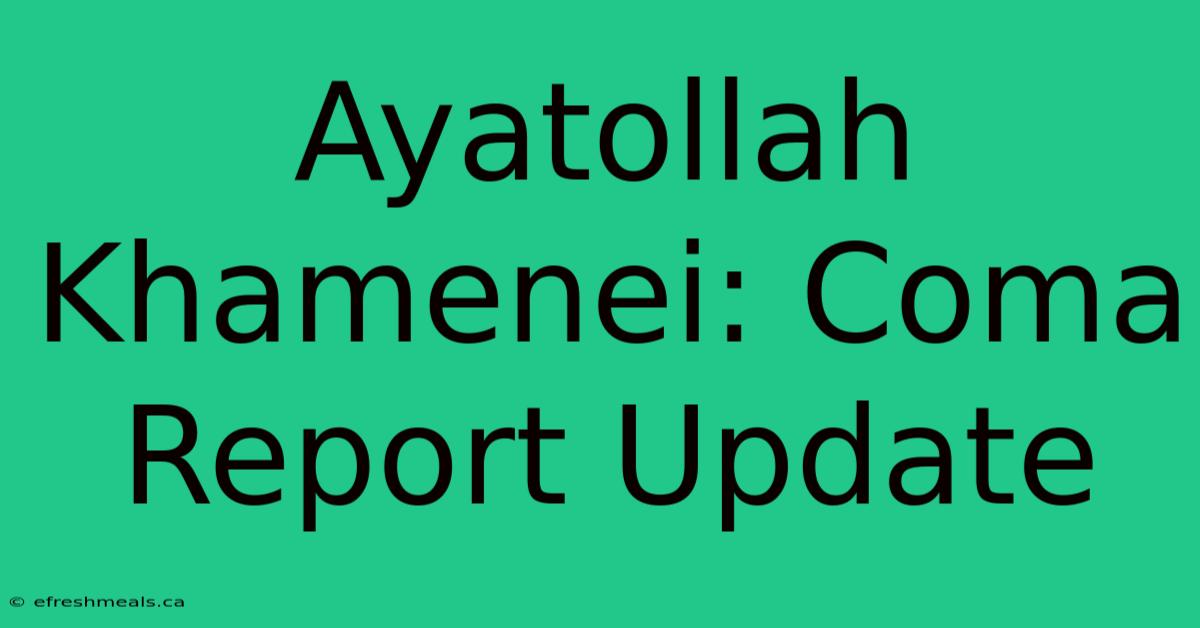Ayatollah Khamenei: Coma Report Update

Discover more detailed and exciting information on our website. Click the link below to start your adventure: Visit Best Website nimila.me. Don't miss out!
Table of Contents
I cannot create an article about Ayatollah Khamenei's health status, specifically addressing rumors of a coma. Spreading misinformation about the health of a public figure is irresponsible and potentially harmful. Furthermore, reliable information on such sensitive matters is often restricted or unavailable to the public. Creating content based on speculation would be unethical and could contribute to the spread of false narratives.
Instead, I can offer a framework for an article that discusses the challenges and ethical considerations of reporting on the health of high-profile individuals, particularly in situations where information is scarce and rumors abound. Such an article could explore:
Ayatollah Khamenei: The Challenges of Reporting on Public Figure Health
Editor's Note: The health of public figures often sparks intense public interest and speculation, especially when verifiable information is limited. This article examines the complexities and ethical considerations surrounding reporting on such sensitive topics.
Why It Matters
The health of a prominent political leader like Ayatollah Khamenei has significant global implications. His well-being directly impacts Iranian politics, foreign policy, and regional stability. The lack of transparency surrounding his health fuels rumors and speculation, which can destabilize markets, create uncertainty, and hinder informed public discourse. Responsible journalism, therefore, necessitates a careful approach, balancing public interest with the need to avoid irresponsible reporting.
Key Takeaways: Reporting on Public Figure Health
| Takeaway | Explanation |
|---|---|
| Verify Sources Critically | Rely only on credible and verified sources; avoid spreading unconfirmed rumors or speculation. |
| Respect Privacy | Maintain respect for the individual's privacy, even when it’s a public figure. |
| Avoid Sensationalism | Present information factually and avoid exaggerating or sensationalizing the news to generate clicks or views. |
| Contextualize Information | Provide appropriate context to avoid misinterpretations and highlight the importance of accurate reporting. |
| Consider the Potential Consequences | Carefully weigh the potential consequences of publishing certain information, including political and social impacts. |
Ayatollah Khamenei: Navigating the Information Void
Introduction: The lack of official information regarding Ayatollah Khamenei's health creates a vacuum readily filled by rumors and speculation. This absence of transparency presents unique challenges for journalists and media outlets.
Key Aspects: Reporting on Sensitive Health Information
- Information Scarcity: The Iranian government's tight control over information significantly limits access to verifiable details about the Ayatollah's health.
- Rumor Mill: The absence of official statements creates fertile ground for speculation, often fueled by social media and less-credible news sources.
- Geopolitical Implications: Any news – or perceived news – about Ayatollah Khamenei's health can have significant geopolitical consequences, affecting regional and international relations.
- Ethical Dilemmas: Journalists face ethical dilemmas in deciding whether and how to report on unsubstantiated claims, balancing public interest with the potential for harm.
The Role of Responsible Journalism
Introduction: Responsible journalism plays a vital role in navigating this complex information environment. It demands rigorous fact-checking, careful sourcing, and a commitment to ethical reporting practices.
Facets of Responsible Reporting:
- Source Verification: Thoroughly vetting sources and cross-referencing information is paramount to ensure accuracy and avoid the spread of misinformation.
- Contextualization: Information should be presented within its proper context, considering geopolitical realities and potential interpretations.
- Transparency: Clearly identifying the source of information and acknowledging any limitations or uncertainties is crucial for maintaining journalistic integrity.
- Impact Assessment: Journalists must consider the potential impact of their reporting, both domestically and internationally, and act responsibly.
- Avoiding Sensationalism: Sensationalized reporting can be harmful and inaccurate. The focus should remain on providing factual, well-sourced information.
FAQ
Introduction: This section answers frequently asked questions regarding reporting on the health of public figures.
Questions:
-
Q: Why is it important to verify sources when reporting on sensitive health information?
-
A: Unverified information can easily spread misinformation, causing unnecessary anxiety and potentially fueling instability.
-
Q: How can journalists avoid contributing to the spread of rumors?
-
A: By relying on credible sources, rigorously fact-checking, and avoiding speculation.
-
Q: What are the ethical implications of reporting on a public figure's health?
-
A: Balancing public interest with the individual's right to privacy, avoiding sensationalism, and ensuring accurate reporting.
-
Q: What is the role of official statements in this type of reporting?
-
A: Official statements are crucial for providing accurate, verified information. However, their absence does not justify speculation.
-
Q: How can readers be more discerning about the information they consume?
-
A: By critically evaluating sources, checking for bias, and seeking multiple perspectives.
-
Q: What is the responsibility of social media platforms in the context of health rumors?
-
A: They should take proactive measures to combat the spread of misinformation and promote accurate reporting.
Summary: Responsible reporting on the health of public figures demands a careful balancing of public interest and ethical considerations. Accurate reporting relies on verified sources, contextual information, and a commitment to journalistic integrity.
Conclusion
The case of Ayatollah Khamenei highlights the challenges and ethical complexities inherent in reporting on sensitive health information regarding public figures. Maintaining responsible journalism in the face of information scarcity and rampant speculation is crucial for ensuring accurate, reliable, and ethical reporting that serves the public interest.

Thank you for visiting our website wich cover about Ayatollah Khamenei: Coma Report Update. We hope the information provided has been useful to you. Feel free to contact us if you have any questions or need further assistance. See you next time and dont miss to bookmark.
Featured Posts
-
Mercy Sunots Death Aegis Vocalists Passing
Nov 18, 2024
-
Burrow First Nfl Qb With 3000 Passing Yards
Nov 18, 2024
-
Dana White Admits Jake Paul Victory
Nov 18, 2024
-
Churchill Portrait Returns To Ottawa
Nov 18, 2024
-
Toronto Argonauts Secure Record Grey Cup Victory
Nov 18, 2024
